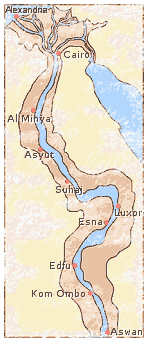 |
The Nile
is the longest river in the world, commencing in the East African
highlands and flowing into the Mediterranean - 6,500km away.
'Egypt' wrote the Greek historian Herodutus in 500BC, 'is so to
speak the gift of the Nile'. This makes sense in that the Egyptian
economy was based on its agriculture - and this depended on the
rich silt that was deposited on the fields during the flooding season,
which lasted from mid-June to mid-October. In addition, the river
had a rich supply of fish, and attracted several migratory birds,
which were caught in nets and traps. Thus the Nile was truly central
to Egyptian civilisation.
In modern day, it still plays a very central role in the life of
most Egyptians. The majority of larger towns are built along the
river's edge, which tends to be a lot greener than the rest of Egypt,
which is mainly desert. The river is still a lifeline for many people;
though maybe for different reasons than 3000 years ago.
Now the commercial aspect is exploited, with thousands of tourists
coming each year for river cruises and to stay in one of the many
renowned "Floating Hotels".
(Ashley
Elsdon Cooke)
|